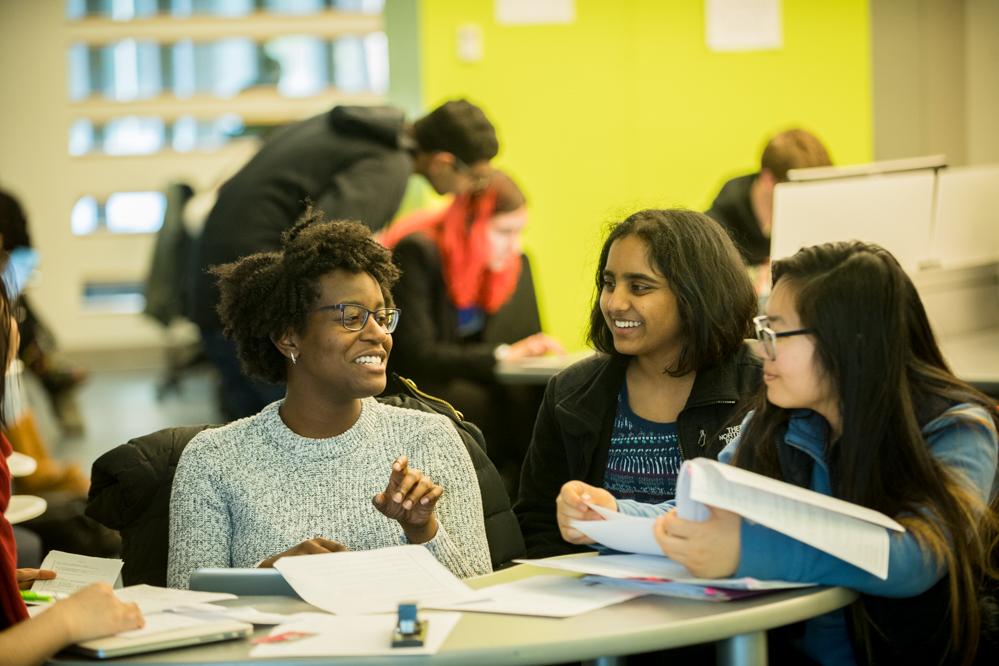Facebook invests to expand Northeastern computer science master’s program for women and underrepresented populations

Facebook has invested $4.2 million to help expand a Northeastern University program that prepares people to switch careers into the technology sector and earn a master’s degree in computer science. The investment will also establish similar pathways at other U.S. universities.
The program focuses on increasing the number of women and underrepresented minorities studying and pursuing careers in computer science in the United States.
Northeastern’s program, called Align, provides students who did not study computer science in college with the opportunity to earn a master’s degree in computer science. Students enrolled in the program have undergraduate degree majors in more than 80 different disciplines, but not in computer science.
Facebook’s investment will, over the course of four years, provide scholarships for 200 students in Northeastern’s Align program. Recipients will include those with demonstrated financial need, as well as women and underrepresented minorities—populations that are less prevalent in computer science, and, more broadly, in the fields of science, technology, engineering, and math. Each scholarship will cover eight credits of coursework at the beginning of the program.

Photo by Adam Glanzman/Northeastern University
Facebook’s support will also entail funding for some startup costs, as well as student scholarships for three other institutions—Columbia University’s Fu Foundation School of Engineering and Applied Science, Georgia Tech College of Computing, and the Department of Computer Science at the University of Illinois at Urbana-Champaign—to launch their own pathways to their existing master’s programs in computer science using best practices from Northeastern’s program.
Facebook’s goals are to build greater awareness around these programs in the U.S., to inspire companies to sponsor similar initiatives at other institutions, and to form a consortium of at least 15 U.S. colleges and universities within four years that focuses on increasing diversity of thought and demographics in computer science.
“Diversity is critical to the success of our industry, and our work at Facebook is no exception. We need to establish and support a workforce that’s representative of the people we aim to connect,” said Andrew Bosworth, a vice president at Facebook. “That’s why Facebook is happy to partner with Northeastern University. We want to scale the Align program, and programs like it, to be part of this collective effort to broaden the talent pipeline of women and underrepresented minorities in computer science.”
“In our early trials of this program we’ve already found dozens of people with intern and FTE roles at Facebook—people who previously didn’t know computer science was an option for them or didn’t feel like it was a career for them,” added Bosworth. We know this works and it’s why we’re increasing our investment here.”
According to Carla Brodley, dean of Northeastern’s Khoury College of Computer Sciences, “Facebook’s financial support and the endorsement of three major universities confirm the success of the Align program. Align addresses critical issues related to workforce development and social equity and inclusion, bringing diverse students to in-demand and economically rewarding careers. The partnership with Facebook allows us to grow one pathway, scaling it not just here at Northeastern but also at other leading computer science schools that care passionately about diversity—of thought, race, gender, and background.”
The Bureau of Labor Statistics has demonstrated a clear need for a larger U.S. workforce in computer science. In fact, the agency projects a 13 percent growth for employment in computer and information technology occupations between 2016 and 2026.
According to the National Science Board, women earned more than half of the bachelor’s degrees awarded in the U.S. in 2015, but only 18 percent of the bachelor’s degrees in computer sciences. Other groups, including African Americans and Latinos, were also underrepresented among those who earn degrees in computer science.
The Align program received seed funding from Pivotal Ventures, an investment and incubation company created by Melinda Gates, and corporate partners, including Dell Technologies, for scholarships to support students in the program. Of the students who began the program this academic year, 52 percent were women and 19 percent of those from the United States were underrepresented minorities.
Students enrolled in Align take introductory classes over their first two semesters to learn the fundamentals of computer science. Then they take graduate-level computer science courses for three semesters. Experiential learning, including co-ops and paid professional internships for students, is a key feature of the program.
“We are in the fourth industrial revolution. Every industry is becoming the technology industry, which is creating unprecedented demand for computing skills and talent,” said Brian Reaves, senior vice president and chief diversity and inclusion officer, Dell Technologies.
“Innovative new programs like Align that expand access and interest in STEM education are critical to our business success, and we are thrilled to see more technology leaders join in support. There are long term benefits for our economy as well as positive impacts for society at large.”
Students who have earned a degree through the Align program since it was launched in 2013 currently work at top technology companies such as Facebook, Apple, Microsoft, Amazon, Google, eBay, and Oracle.
More than 575 students are currently enrolled in the Align program. The program is offered at Northeastern’s locations in Boston, Seattle, Silicon Valley, the San Francisco Bay Area, and Charlotte, North Carolina. The university has a goal to extend the program to its sites in London, Toronto, and Vancouver.
For media inquiries, please contact media@northeastern.edu.





